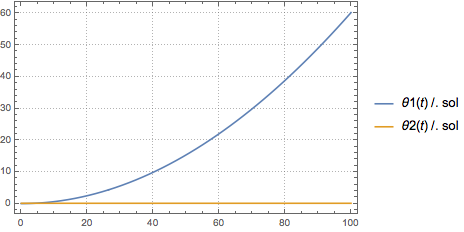If c1 cnd c2 are zero, the code responds very well; but if one of c1 or c2 is nonzero, the code doesn't work correctly. I get the error
NDSolve::ndinid: Initial condition {0} is not in the range specified by the discrete variable NDSolve`s$147246. >>
I think it's because of the Sign function.
Without the Sign function, the code works properly.
I would like it to work correctly, and also I would like to know why this code didn't work properly.
ClearAll[θ1, θ2];
m1 = 1; m2 = 1; lc1 = 1; lc2 = 1; l1 = 2; l2 = 2; Ix2 = 1; Iy2 = 1; Iz1 = 1;
Iz2 = 1; g = 9.81; Im1 = 1; Im2 = 1; η1 = 28; η2 = 28; b1 = 1; b2 = 2;
c1 = 0; c2 = 1;
τ1[t_] := 10;
τ2[t_] := 10;
u1[t_] := τ1[t] - b1*θ1'[t] - c1*Sign[θ1'[t]];
u2[t_] := τ2[t] - b2*θ2'[t] - c2*Sign[θ2'[t]];
m11[t_] := m1*(lc1)^2 + m2*(l1 + lc2*Cos[θ2[t]])^2 +
Ix2*(Sin[θ2[t]])^2 + Iy2*(Cos[θ2[t]])^2 + Iz1;
m22[t_] := m2*(lc2)^2 + Iz2;
V11[t_] := 0;
V12[t_] := (-2*m2*lc2*(l1 + lc2*Cos[θ2[t]])* Sin[θ2[t]] +
2 (Ix2 - Iy2)*Sin[θ2[t]]*Cos[θ2[t]])*θ1'[t];
V21[t_] := (m2*lc2*(l1 + lc2*Cos[θ2[t]])* Sin[θ2[t]] -
(Ix2 - Iy2)*Sin[θ2[t]]* Cos[θ2[t]])*θ1'[t];
V22[t_] := 0;
M = {{m11[t], 0}, {0, m22[t]}} + {{Im1*(η1)^2, 0}, {0, Im2*(η2)^2}};
V = {{V11[t], V12[t]}, {V21[t], V22[t]}};
G = {{0}, {m2*lc2*Cos[θ2[t]]*g}};
initu = q[0] == {{0}, {.1}};
initv = q'[0] == {{0}, {0}};
q[t_] := {θ1[t], θ2[t]};
sol = First@ NDSolve[{Thread[M.q''[t] + V.q'[t] + G == {u1[t], u2[t]}], initu,
initv}, q[t], {t, 0, 100}];
Plot[{θ1[t] /. sol, θ2[t] /. sol}, {t, 0, 100}, PlotTheme -> "Detailed"]


